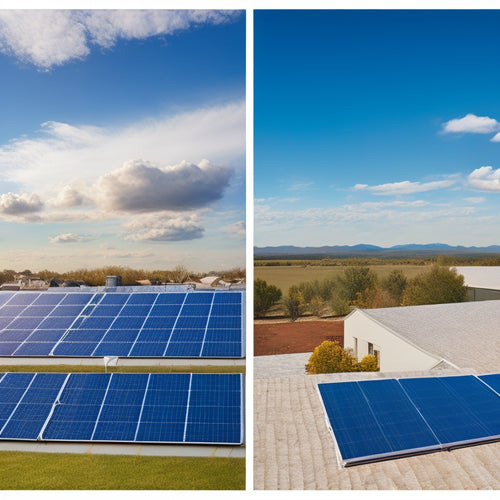
Best Solar Panels for Your House Installation
Share
When selecting the best solar panels for your house installation, it is vital to reflect on your energy needs, evaluating your household's daily usage in kWh to determine the required panel capacity. Monocrystalline and polycrystalline panels vary in efficiency, with monocrystalline offering higher rates. Calculate your daily energy usage in watt-hours to determine the necessary wattage, ensuring your system matches your consumption for efficient power supply. Focus on high-efficiency ratings, durability, and reputable manufacturers offering long warranties. With the right panels, you'll maximize your investment's potential and take the first step towards a sustainable energy future, and there's more to investigate in making an informed decision.
Key Takeaways
- Assess your household's energy consumption patterns to determine the right solar panel capacity for your needs.
- Choose solar panels with high efficiency rates (above 20%) for maximum power output and consider durability for long-term performance.
- Select the appropriate wattage for your solar panel system based on your daily energy usage in watt-hours (Wh) and available roof space.
- Research and compare top solar panel brands, considering their commitment to quality, innovation, and customer satisfaction.
- Ensure you understand the warranty and customer support offered by the manufacturer, with a minimum 25-year warranty for protection.
Understanding Your Energy Needs
Most households consume a significant amount of energy to power their appliances, lights, and HVAC systems, making it essential to understand your energy needs before installing solar panels.
You need to determine how much energy your household consumes to choose the right solar panel system that meets your requirements.
To do this, you'll need to assess your energy consumption patterns. Start by reviewing your past electricity bills to identify your average daily energy usage in kilowatt-hours (kWh).
You can also conduct an energy audit to identify areas of inefficiency in your home. Take note of the wattage of your household appliances and the number of hours they're used daily. This will give you a better understanding of your energy needs.
Top Solar Panel Brands
You're likely familiar with some of the leading industry players in the solar panel market, but it's crucial to know which top-rated manufacturers offer the best products for your house installation.
These brands have established themselves through their commitment to quality, innovation, and customer satisfaction.
Leading Industry Players
The solar panel market is dominated by a handful of industry giants that have consistently provided high-quality products and innovative solutions.
You'll find that these leading industry players are constantly pushing the boundaries of what's possible, driving market trends and future innovations. Their commitment to research and development has led to significant advancements in solar panel efficiency, durability, and affordability.
As you investigate the solar panel market, you'll likely come across names like Trina, Hanwha Q CELLS, and Jinko Solar.
These companies have established themselves as leaders in the industry, with a strong reputation for supplying high-performance solar panels that meet the demands of homeowners like you. They've achieved this through a combination of state-of-the-art technology, rigorous testing, and a focus on customer satisfaction.
Top Rated Manufacturers
Five prominent solar panel brands stand out from the rest for their exceptional quality, reliability, and performance. You'll want to examine these top-rated manufacturers when selecting the best solar panels for your house installation. They've established themselves through rigorous testing, certifications, and customer satisfaction.
These brands prioritize innovation, investing heavily in research and development to improve their manufacturing processes. They focus on sustainability initiatives, ensuring their products minimize environmental impact throughout their lifecycle. You can trust that their solar panels will provide you with clean, efficient energy for years to come.
Leading brands like Trina Solar, Canadian Solar, and Hanwha Q CELLS offer high-efficiency modules with impressive warranties. Other notable manufacturers, such as Jinko Solar and LONGi Solar, boast state-of-the-art technology and impressive durability.
When evaluating these top-rated manufacturers, you'll find that each brand brings unique strengths to the table. By understanding their distinct advantages, you can make an informed decision about which solar panels best fit your energy needs and budget.
Monocrystalline Vs Polycrystalline
When you're choosing between monocrystalline and polycrystalline solar panels, you're deciding between two distinct cell structures that impact performance.
Monocrystalline cells are cut from a single crystal of silicon, while polycrystalline cells are made from multiple crystals melted together.
You'll want to evaluate how these differences affect efficiency, as monocrystalline panels typically outperform polycrystalline ones in this regard.
Cell Structure Matters
Opting for high-efficiency solar panels means scrutinizing the cell structure, an important factor in determining their performance and lifespan. As you consider monocrystalline and polycrystalline options, you'll notice distinct differences in their cell structure.
Monocrystalline cells boast higher efficiency rates due to their uniform crystal structure, which allows for better electron flow. This results in improved cell efficiency and longevity. Polycrystalline cells, on the other hand, have a more irregular crystal structure, leading to slightly lower efficiency rates.
When it comes to module aesthetics, monocrystalline cells tend to appear more uniform and sleek, while polycrystalline cells may have a more speckled appearance.
Temperature coefficient is another significant factor, as it affects how well panels perform in high-heat conditions. Monocrystalline cells generally have a lower temperature coefficient, making them more suitable for hot climates.
Additionally, recycling options and installation flexibility should be considered, as well as cell interconnection, which can impact performance degradation over time. By carefully evaluating these factors, you can make an informed decision about the best solar panels for your house installation.
Efficiency Comparison
You've weighed the importance of cell structure in your search for the best solar panels for your house installation.
Now, it's time to explore the efficiency comparison between monocrystalline and polycrystalline solar panels.
Both types have their strengths and weaknesses, but when it comes to efficiency, monocrystalline solar panels take the lead.
With an average efficiency rate of 20%, they outperform polycrystalline panels, which average around 15-17%. This increased efficiency translates to more power per hour of sunlight, making monocrystalline panels ideal for rooftops with limited space.
However, they come at a higher cost.
Polycrystalline panels, on the other hand, are more budget-friendly and still offer decent efficiency.
They're a great option for those who want to balance cost with performance.
As solar panel innovations continue to advance, we can expect to see improvements in both types.
When paired with energy storage solutions, both monocrystalline and polycrystalline panels can provide a reliable source of power for your home.
Ultimately, the choice between the two comes down to your specific needs and budget.
Choosing the Right Wattage
Your solar panel system's wattage determines how much electricity it can produce, making it a critical factor in powering your home efficiently. To guarantee you're getting the right amount of power, you'll need to calculate your energy consumption and determine the ideal wattage for your system.
Here are three key considerations to keep in mind when choosing the right wattage:
-
Energy consumption: Calculate your daily energy usage in watt-hours (Wh) to determine how much power you need to generate. Consider factors like the number of appliances, lighting, and HVAC systems in your home.
-
Wattage calculation: Use your energy consumption calculation to determine the required wattage. A general rule of thumb is to install a system that can produce 1 watt of power for every 1 watt-hour of energy consumed.
-
System size and layout: Consider the physical space available for your solar panel installation and the layout of your roof. A larger system may require more space, but it can also provide more power.
Efficiency and Durability Matters
Now that you've determined the ideal wattage for your solar panel system, it's time to focus on the quality of the panels themselves. When evaluating solar panels, efficiency and durability are vital factors to take into account.
You want panels that can convert sunlight into electricity efficiently and withstand the elements for years to come. Look for panels with high efficiency ratings, typically above 20%. This guarantees you're getting the most power out of your system.
Durability is also essential, as it directly impacts the solar panel lifespan. A longer lifespan means less waste and a reduced environmental impact. Reputable manufacturers typically offer 25-year or more warranties on their products.
Be wary of cheap alternatives that may not last as long, as they can end up costing you more in the long run. By prioritizing efficiency and durability, you'll be generating clean energy for years to come while minimizing your environmental footprint.
Budget-Friendly Solar Options
Solar shoppers on a budget can still access quality panels without breaking the bank. You don't have to sacrifice performance for affordability, as many manufacturers offer cost-effective options without compromising on efficiency.
When exploring budget-friendly solar options, consider the following:
-
Affordable financing: Many solar panel manufacturers and installers offer financing options that can help spread the cost of installation over time. This can make solar energy more accessible to those on a tighter budget.
-
Community solar: Community solar programs allow multiple individuals or organizations to share the benefits of a single solar array. This model can provide a more affordable entry point for those who may not be able to install panels on their own property.
-
Tier 2 and Tier 3 panels: While Tier 1 panels are considered premium, Tier 2 and Tier 3 panels can offer similar performance at a lower cost. These panels may not have the same warranty or durability as Tier 1 panels, but they can still provide reliable energy production.
Inverter Types and Selection
You'll need to choose an inverter that suits your solar panel system, and there are two primary types to evaluate: string inverters and microinverters.
String inverters connect multiple panels in a series, converting their combined DC power to AC, while microinverters are attached to individual panels, converting each one's DC power to AC separately.
String Inverter Types
Typically, string inverters are the most common type of inverter used in residential solar panel systems. As you consider installing solar panels on your house, it's important to understand the string inverter type. A string inverter connects multiple solar panels in a string to convert DC power to AC power. This setup allows for a single inverter to handle the output of multiple panels.
String inverters offer several advantages, including:
-
Cost-effectiveness: String inverters are generally less expensive than other inverter types, making them a more affordable option for homeowners.
-
Easy installation: String inverters are relatively simple to install, reducing labor costs and time.
-
High efficiency: String inverters can achieve high efficiency rates, converting a significant amount of DC power to AC power.
However, string inverters also have limitations. For instance, if one panel in the string is shaded or malfunctioning, it can affect the entire string's performance.
Additionally, string inverters may not be suitable for complex or irregularly shaped roofs. Despite these limitations, string inverters remain a popular choice for residential solar panel systems due to their cost-effectiveness and ease of installation.
Micro Inverter Options
As an alternative to string inverters, micro inverters offer a more decentralized approach to converting DC power to AC power. With micro inverters, each solar panel is equipped with its own inverter, allowing for a more flexible and efficient energy conversion process. This setup enables you to monitor and control each panel individually, optimizing energy production and reducing losses.
One of the significant micro inverter advantages is its ability to mitigate the effects of shading, debris, or panel mismatch, which can negatively impact energy production in string inverter systems. Additionally, micro inverters provide greater design flexibility, making them ideal for complex or irregularly-shaped roofs.
However, micro inverter disadvantages include higher upfront costs and increased complexity, which can make installation and maintenance more challenging. Despite these drawbacks, micro inverters are an attractive option for homeowners seeking maximum energy yield and a more reliable, long-term investment.
Installation and Maintenance Costs
Calculating the total cost of solar panels for your house involves more than just the sticker price of the equipment.
You'll need to factor in installation and maintenance costs to get a complete overview of your investment.
When it comes to installation, you'll want to take into account the following:
-
Labor costs: The cost of hiring a professional to install your solar panels can vary depending on the complexity of the job and the installer's experience.
-
Installation techniques: The type of installation technique used can impact the overall cost. For example, a roof-mounted system may be more expensive than a ground-mounted one.
-
Permitting and inspection fees: You'll need to obtain permits and undergo inspections to ascertain your system meets local building codes and safety standards.
In terms of maintenance, regular cleaning and inspections are essential to guarantee your system operates at peak efficiency.
You may also need to replace inverters or other components over time.
Local and National Incentives
Beyond the initial investment, you can greatly reduce the cost of solar panels for your house by taking advantage of local and national incentives. Federal tax credits, for instance, allow you to claim a notable percentage of your solar panel installation costs as a tax deduction.
In addition, many states offer rebates and installation grants to encourage the adoption of solar renewable energy. You can also benefit from net metering, which enables you to sell excess energy back to the grid and offset your electricity bills.
Moreover, financing options like solar power loans and community solar programs can make solar energy more accessible. Some energy efficiency upgrades, such as insulation and window replacements, may also qualify for incentives.
When comparing solar incentives, consider factors like the amount of the incentive, eligibility requirements, and application deadlines. By leveraging these incentives, you can considerably reduce the upfront cost of solar panels and enjoy a faster return on your investment.
Warranty and Customer Support
Reliability is the backbone of a successful solar panel installation, and a thorough warranty and customer support system are essential in guaranteeing that your investment generates returns for years to come.
When evaluating solar panels, you should carefully review the warranty terms to verify they align with your expectations.
Here are three key aspects to evaluate:
-
Duration of warranty: Look for providers that offer a minimum 25-year warranty on their solar panels. This guarantees that you're protected against defects and performance degradation over the long term.
-
Scope of warranty coverage: Check if the warranty covers parts, labor, and performance guarantees. A thorough warranty should cover all these aspects to minimize your financial risk.
-
Customer service and support: Assess the quality of customer service and support offered by the provider. You want a provider that's responsive to your queries and concerns, and can provide timely assistance in case of issues.
Frequently Asked Questions
Can I Install Solar Panels on a Metal or Clay Tile Roof?
You can install solar panels on a metal roof with a specialized mounting system, but for clay tile roofs, you'll need to evaluate additional structural integrity and waterproofing measures to guarantee a secure and leak-free metal roof installation.
Will Solar Panels Work During a Power Outage?
Imagine being surrounded by darkness during a power outage, but your lights stay on, thanks to your solar panel efficiency and battery storage. You'll have peace of mind knowing you've got a reliable backup, even when the grid goes down.
Do Solar Panels Require Frequent Cleaning and Maintenance?
You'll need to prioritize solar panel upkeep, as dust and debris can reduce energy output by up to 25%. Cleaning frequency depends on your location, but generally, you'll need to clean your panels every 6-12 months to maintain peak performance.
Can I Add More Panels to My Existing Solar System Later?
Did you know that 85% of homeowners consider expanding their solar panel system within 5 years? You can add more panels to your existing system later, but verify system compatibility and consult with a professional to guarantee a seamless solar panel expansion that meets your growing energy needs.
Are Solar Panels Compatible With Smart Home Systems?
You'll be pleased to know that solar panels can seamlessly integrate with smart home systems, enabling solar integration with smart technology, allowing you to monitor and control your energy production and consumption in real-time.
Related Posts
-

What You Need to Know About Permits and Inspections
You need to navigate the complex landscape of permits and inspections to guarantee your project complies with local z...
-

Why Invest in Residential Solar Panel Systems?
By investing in a residential solar panel system, you'll harness renewable energy, reducing your carbon footprint and...
-

Tracking Solar Panels Vs Fixed Panels Cost Savings
When considering solar panel options, you'll want to weigh the cost savings of tracking solar panels versus fixed pan...


